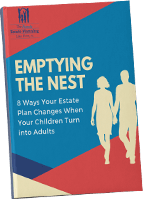
One of your most important duties as a parent is to select and legally document guardians for your children. This doesn’t mean automatically naming godparents or trusting that the grandparents will step in if necessary, assuming they will even be young and healthy enough to do so. As a responsible parent, you need to carefully consider and decide who would be the best people to raise your children if you could not. And then you need to legally document your choice and make sure the people you’ve chosen would know what to do when called upon.
However, because most people have no idea how to start this process, much less create a legally binding plan, they simply never get around to it. The few who do often make at least one of several common mistakes—even if they’ve worked with a lawyer. That’s because most lawyers haven’t been trained properly to help parents with this vital issue.
Unless you’ve worked with our team or another trained Personal Family Lawyer®, it’s likely your children are extremely vulnerable to being placed in the care of strangers should the worst happen to you. This situation might be temporary while the authorities figure out what to do; but it’s also quite possible that your children could be raised to adulthood by someone you’d never choose, and may not even know, if you haven’t planned correctly.
Now that we have your attention, we’ve outlined some basic steps to help you in the process of selecting and naming legal guardians:
1. Define your ideal candidate
Make a list of the qualities and attributes you and your partner value most when it comes to the long-term care of your children. The list can mirror your own parenting philosophy and style as well as the qualities that would define your absolute “dream” guardian.
In addition to qualities like parental values, discipline style, religious/spiritual background, kindness, and honesty, also consider more practical matters. Is the person young enough and physically capable of raising your kids to adulthood? Do they have a family of their own, and if so, would adding your kids to the mix be too much?
Geography should also come into play—do they live nearby, and if not, would it be a major hardship to relocate your children? Is their home in a location you would feel comfortable having your kids grow up in?
2. Make a list of candidates
Based on those parenting qualities, start compiling a list of the people in your life who match your ideals. Be sure to consider not only family, but also close friends.
Though you may feel obligated to choose a family member, this decision is about what’s best for your children’s future, not protecting someone’s feelings. If you’re having trouble coming up with enough suitable candidates, try identifying the people you would definitely NOT want as guardians, and work backwards from there.
Or consider who a judge would likely select if you didn’t make your own choice, and who you might prefer to raise your children.
3. Select first responders (short-term guardians, or temporary guardians)
Here’s where estate plans that only name a legal guardian through a Will typically fail. In addition to legally naming long-term guardians, you also need to choose someone in your local area to be a “first responder,” or temporary guardian. This is someone who lives near you and who’s willing to immediately take care of your children during a time of crisis until the long-term guardian is notified and appointed by the court pursuant to your long-term guardianship nomination.
If your children are in the care of someone like a babysitter without legal authority to have custody of them, the police will have no choice but to call the Department of Children and Families and take your children into the care of the authorities. From there, your children could be placed in the care of strangers until your named long-term guardian shows up, or until the court decides on an appropriate guardian.
It’s imperative that all temporary caretakers know exactly how to contact long-term guardians. This precaution is not just about your death—it also covers your incapacity and any other situation when you’re unable to return home for a lengthy period of time.
4. Narrow your candidate list and rank your choices
When you’ve come up with all your guardian candidates, narrow the list to your top five people. There’s no guarantee that your ideal candidate(s) will be willing to serve as guardian, so having more than one or two is a practical necessity.
To aide in this process, consider questions such as who really loves your children and who do your kids really get along with? Who will be physically, mentally, and emotionally able to raise your kids to adulthood? The most important thing is to choose SOMEONE you trust, even if you aren’t 100% sure about them, since you can always select a new guardian later.
Then rank your choices from top choice down to last. Again, backups are critical in case your first choice cannot serve.
5. Discuss your expectations with your top candidates
When it comes to asking someone to be your child’s guardian, you need to provide crystal-clear guidance about what’s involved. The discussion should cover all of your expectations about how you want your kids raised. Speak openly about finances, discipline, education, spirituality, and any needs that are unique to your children.
Once the discussion is complete, give your candidate a few days to carefully consider their choice, even if they seem immediately gung-ho. Depending on your children’s ages, your potential guardian could be making a commitment lasting a decade or longer. Without careful thought, their desire to help could easily turn into resentment that negatively impacts your kids over time.
6. Legally document your plan
It’s essential to legally document your choice as soon as possible. Verbal commitments mean nothing in the eyes of the law. This is especially true when you name a friend over a family member.
Get Started Now
While catastrophe rarely strikes both parents of a minor child, it does occur. And the consequences are simply too severe to justify not taking the few simple steps needed to keep your children protected. Please book a call with Lori, our Client Services Coordinator, who can answer your questions and set a time for you to meet with one of our attorneys immediately.
Even if you don’t have minor children, please share this article with friends or family who do—it’s that important.












